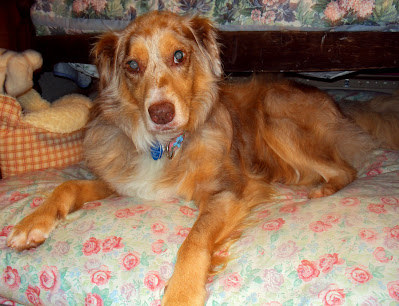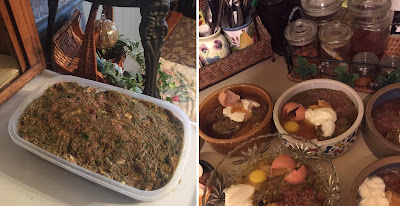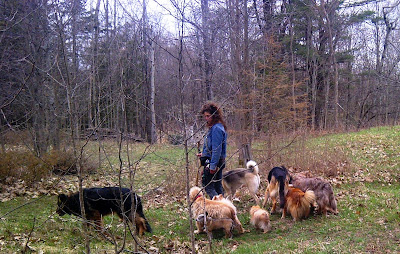Natural Treatment for Diarrhea in Dogs, Cats - Cause and Remedy
★ 10.5 min read
In this article:
- Acute v.s. Chronic Diarrhea
- Common Causes of Acute Diarrhea
- Common Causes of Chronic Diarrhea
- Symptoms of Diarrhea
- When to Intervene
- When to Get Help
- At Greatest Risk
- Dehydration
- Foods To Avoid
- Foods To Help Treat Diarrhea
- Herbs to Help Treat and Remedy Diarrhea
- Proactive Maintenance
1. Acute v.s. Chronic Diarrhea
1.1 Acute Diarrhea
Diarrhea
is a common ailment in dogs and cats. Just as with humans, healthy dogs and
cats suffer from an ‘upset’ stomach on occasion, which then results in a loose
stool or diarrhea - this is a fairly normal occurrence and is called ‘Acute
Diarrhea’. Acute diarrhea is one of the
body’s natural ways of removing
substances that are not welcome in the body. The most common cause of this type
of diarrhea is ingestion of a food component that your individual animal is intolerant of, or that ingesting something that is generally inappropriate for all dogs or cats.
Although diarrhea is a natural process, it is important to monitor Acute
Diarrhea.
If your animal's acute diarrhea was caused by a minor indiscretion (e.g. consuming something she has an intolerance to), the symptoms should disappear within a 72 hour time period.
If the issue is due to a significant issue such as acute pancreatitis, this can be a life-threatening emergency - your dog or cat needs immediate assistance. Call your animal's health care provider or emergency clinic ASAP.
1.2 Chronic Diarrhea
The
other type of Diarrhea is called ‘Chronic Diarrhea’. The underlying cause of
this type of diarrhea is typically rooted in an ongoing condition in which the
body is repeatedly exposed to an irritant or the diarrhea is a symptom of a
medical condition.
Common Causes of Diarrhea
As noted above the most common
cause of acute diarrhea is ingestion of food or other substances that the dog
or cat should not be eating, such as poisonous/toxic plants.
Its important
to make sure that your dog or cat cannot gain access to garbage - inside the home, in
your garage, yard, on walks and when on off-leash excursions. Although many
foods that are consumed by humans are fine for dogs, there are many foods that
a dog and cat should never eat - at best these foods will irritate a dog’s or cat's gastrointestinal (GI) tract and
at worst make a dog or cat seriously ill. Eating rotting food can also trigger
diarrhea.
2. Common Causes of Acute Diarrhea
A partial list:
-
Anxiety
and stress.
- Conventional medications, side effect of conventional medications (antibiotics, Metacam, Pancur, Prednisone, Rimydal, etc).
- Food intolerance.
- Consuming indigestible substances.
- Consuming too much of a food that would otherwise be good for the dog or cat.
- Consuming appropriate foods.
- Parasitic infestation such as coccidia, giardia, intestinal worms, etc.
- Poisons, toxins.
- Sudden change in food or addition of new food to the diet.
- Virus, such as distemper, parvo.
3. Common Causes of Chronic Diarrhea
A parital list:
-
Allergy
to foods in the diet.
- Compromised immune system.
- Conventional medications.
- Diseases such as colitis, inflammatory bowel disease, liver and kidney disease, stomach cancer, etc.
-
Parasitic infestation such as coccidia, giardia, intestinal worms, etc.
- Poisons, toxins.
- Poor quality food.
- Poorly functioning GI tract.
- Too much fat in diet and /or the wrong type of fat.
- Conventional medications including chemical-based veterinarian prescribed and off-the-shelf heartworm, flea, tick preventatives.
- Over-feeding.
- Your dog is standing at the door anxiously, or anxiously trying to get your attention to let him outdoors at a time when they would normally not be asking.
- Your dog asks to go out multiple times (to eliminate) within the space of an hour or several hours.
- In either case let your dog out and watch what he does.
- If he eliminates take a quick look to see if his stool is normal (firm, brown) or loose.
- Your dog or cat is straining to eliminate - although this may be a result of constipation, it is often also a result of repeated bouts of diarrhea.
- Diarrhea causes disruption of normal muscle contractions in the GI tract…thereby giving the sensation that elimination is required even when there is nothing left in the GI tract to eliminate.
- Other symptoms include:
- Bloating.
- Dehydration.
- Lack of appetite.
- Listlessness.
- Fever.
5.0 When to Intervene
Make sure that your dog and cat has access to fresh drinking water. Watch to see if they are drinking. If they aren't drinking water, follow the instructions provided below under ‘Dehydration’.
If
the diarrhea occurs just once you can continue to feed your animal as you
normally would.
If the diarrhea is occurring repeatedly within the space of an hour or several hours:
- Begin a treatment of slippery elm with a little bone broth (see further below).
- Withhold food for at least a few hours while you repeatedly dose every 30 minutes to 60 minutes with slippery elm bark and bone broth.
- Then proceed to feed your dog or cat as per the instructions provided further below.
6. When To Get Help
Help is required if one of more of the following occurs:
- Severe diarrhea persists for more than 24 hours.
- Diarrhea continues to occur for more that 3 days.
- Blood in your dog or cat's stool.
- Fever.
- Sluggishness.
- Weakness.
- Or any other sign of debilitation.
7. At Greatest Risk
Young (puppies and kittens) and the old or those whose health is already
compromised are most vulnerable to suffering complications from diarrhea.
Dehydration as a result of diarrhea can occur very quickly in these high-risk
animals, putting them in immediate and serious risk.
8. How To Prevent Dehydration
- Make one of these homemade broth recipes.
- If your dog or cat is not drinking on his own offer the broth at least 3 to 4 times a day.
Don’t give your dog or cat a commercially made broth as it can
include a lot of sodium (salt) which will cause further dehydration, it may
also contain additives such as food coloring, spices such as pepper, and other
dangerous food stuffs such as onions and sugar - sugar feeds bad bacteria which will make diarrhea worse.
- Pull up gently on the skin at the back of the neck.
- If when released the skin bounces back quickly, your dog or cat's hydration level is fine.
- If the skin does not does not go back in-place or goes back slowly, your dog or cat is dehydrated and needs medical attention right away.
- Take your dog or cat into your veterinarian ASAP.
- Fluid injection may be administered along with a saline drip.
9.0 Foods To Avoid
Don't give your dog or cat their regular food.
Rice
Many veterinarians recommend rice when a dog or cat has diarrhea. Terrible advice.
Rice sits and lingers in a dog and cat's gut where it:
- Ferments.
- Causes gas.
- Causes, and worsens diarrhea.
Rice is health damaging for a healthy dog, and worse for a dog that is ill.
Learn more about how rice harms the health of dogs and cats:
- Go to this article.
Beef
Many veterinarians recommend rice and beef when a dog or cat has diarrhea. Again, terrible advice.
Even lean beef has too much fat for a dopg with diarrhea.
Beef will exacerbate the diarrhea.
Pepto Bismal
Do NOT give your dog or cat Pepto Bismal.
Pepto Bismal contains salicylates.
Salicylates are used as a conventional analgesic (pain killer). However salicylates will aggravate your dog and cat's symptoms.
Pepto Bismal:
- Destroy the gastrointestinal tract.
- Causes dementia.
10. Foods to Help Treat Diarrhea
Start with small doses of bone broth (or short-cooked broth) and slippery elm bark every 30 minutes.
Bone broth recipe:
- Go to this article.
- Go to this article.
Slippery elm bark
- See instructions further below.
Don't give food at this time.
Continue the bone broth and slippery elm bark, for at least a few hours.
10.2 When To Offer Food
When the diarrhea has stopped:
- Offer a little plain cooked turkey or white fish.
- If you don't have turkey or white fish, offer chicken instead.
- Continue offering the broth as well.
If after eating this your dog or cat does not experience additional diarrhea, you can offer a small amount of pumpkin or squash (see recipe further below).
Offer the plain cooked turkey and pumpkin or squash to your dog 3 to 6 times a day in small amounts for up to 3 days (72 hours), by which time the diarrhea should subside
Offer the plain cooked turkey and pumpkin or squash to your dog 3 to 6 times a day in small amounts for up to 3 days (72 hours), by which time the diarrhea should subside
If your dog or cat still has
diarrhea after 72 hours its time to get professional help.
10.3 Food Recipe
You'll Need
10.3 Food Recipe
You'll Need
- Pumpkin or winter squash (e.g. butternut squash, acorn squash, etc.).
- Turkey, white fish or chicken.
About Pumpkin or Squash
Use 100% pure, plain, cooked pumpkin, or 100% pure, plain, canned pumpkin. Do not
use pumpkin pie filling as it will make your animals condition worse. Pumpkin
pie filling has sugar, spices and other ingredients besides pumpkin.
Plain,
cooked turkey breast meat or plain, cooked white fish, or cooked chicken breast meat
- Don’t use processed chicken or turkey sandwhich meat.
- Use real whole breast meat cooked and cut in small pieces or cooked ground-up breast meat, or;
- Use the chicken or turkey from making broth.
- If you are using whole breast meat rather than ground meat, trim off all fat prior to cooking. After cooking drain the meat to remove any remaining fat.
Use a ratio of 50:50 pumpkin to meat.
Mix the pumpkin with the turkey, white fish (or chicken).
Offer small portions to your animal 3 to 6 times a day for
up to 3 days (72 hours), by which time the diarrhea should subside.
11. Herbs and Alternative Medicines to Treat Diarrhea
11.1 Slippery Elm Bark
The
herb ‘slippery elm’ is an excellent natural anti-diarrhea remedy.
Slippery elm is safe for
puppies and dogs of all ages.
- Slippery elm (Ulmus fulva) has been used as an herbal remedy for centuries.
- Slippery Elm contains mucilage.
- Mucilage is a substance that when mixed with water, turns into a lubricating gel. It works to coat and sooth the mouth, throat, stomach, and intestines. It also contains antioxidants that help relieve inflammation. In addition, Slippery Elm triggers reflux stimulation of nerve endings in the GI tract, thereby promoting increased mucus secretion. This helps protect the GI Tract against excess acidity and ulcers.
- Slippery Elm powder is available at most health food stores and from on-line herbal suppliers.
There
are two simple ways to administer the slippery elm bark:
Add the slippery elm bark directly to food.
The
dosage is ½ tsp of slippery elm bark powder for every 10lbs of body weight.
Option Two:
Make a syrup with the slippery elm bark.
- Combine one teaspoon of slippery elm powder with one cup of cold water.
- Bring the mixture to a boil and stir.
- Turn the heat down and let the mixture simmer for 2 to 3 minutes.
- Remove from heat.
- Allow the liquid to cool to room temperature.
- Administer the Slippery Elm syrup to your dog or cat 4 times per day using the following dosage for each treatment:
- Small dogs - 1 teaspoon, four times a day
- Medium dogs - 1 to 2 tablespoons four times a day
- Large dogs - 3 to 4 tablespoons four times a day
To learn more about slippery elm bark:
- How it works,
- Health benefits,
- Dosage and instructions for use;
11.2 Colloidal Silver
Silver is a
natural and powerful broad spectrum antibiotic agent, it is also has excellent
antiseptic, antifungal and disinfectant properties.
To learn more about Colloidal Silver:
- How it works.
- Dosage and instrutions for use;
11.3 Grape Fruit Seed Extract
Grapefruit seed extract has been proven to be effective in fighting 800 bacteria strains and viruses.
To learn more about Grapefruit Seed Extract:
- How it works,
- Dosage and instructions for use;
Go to this article.
12. Proactive Maintenance
Once
your dog or cat is on the mend you can look at adding some healthy immune boosting
food stuffs to his/her diet. Just make sure that you only add on item at a time
- this way if your dog or cat has any sensitivity to the item it is easy to identify
which new food item is causing the sensitivity.
12.1 Probiotics
Adding
a good quality plain yogurt or kefir is a great way to help your dog maintain a healthy
flora of good bacteria in his/her GI tract.You can read here for information on daily dosage, selecting a truly good yogurt or kefir, and other health benefits.
If you would prefer to use a probiotic supplement read here for guidelines on choosing a good product - most are not effective and are a waste of money.
12.2 Herbs
Add some herbs to your dog’s daily diet to boost their immune system and
build their defence against bad bacteria.
Calendula
The
antiseptic quality of the herb helps prevent bacterial growth, which is good
news for your dog and bad news for the bacteria.
Goldenseal
This
herb is a powerful antibiotic that prevents the bacteria from latching onto the
cell walls. It is particularly useful for treating stomach and bowel ailments.
Echinacea
Echinacea
has antibiotic, anti-viral and immune system stimulating properties - it is
very useful for preventing bad bacteria from flourishing.
The
table below provides a general guideline for daily intact of herbs/spices based on your dog’s and cat's
weight.
General Dosing Guidelines for Herbs and Spices
Weight
|
Dry
Powders
|
Teas
|
Capsules/Tablets
|
Tinctures
|
1-10 lbs
|
a
small pinch up to 1/8 tsp
|
less
than 1/4 cup, 1-3 times/day
|
1/2
capsule, 1-3 times/day
|
1-3
drops, 2-3 times/day
|
10-20 lbs
|
1
larger pinch - 1/8 to ¼ tsp
|
1/4
cup, 1-3 times/day
|
1/2-1
capsule/tablet, 1-3 times/day
|
3-5
drops, 2-3 times/day
|
20-50 lbs
|
2
pinches - 1 teaspoon
|
1/4-1/2
cup, 1-3 times/day
|
1-2
capsules/tablets, 2-3 times/day
|
5-10
drops, 2-3 times/day
|
50-100 lbs 10-
|
2
pinches - 2 teaspoons
|
1/2-1
cup, 1-3 times/day
|
1-2
capsules/tablets, 3-4 times/day
|
20
drops, 2-3 times/day
|
Over 100 lbs,
|
up to
1 tablespoon
|
up to
1 cup 3 times/day
|
adult
human dose
|
adult
human dose
|
Caution:
While certain herbs and spices do not create a hazard by themselves
they can interfere with the conventional medicines. If your dog is on any of conventional medicines please make sure you consult your veterinarian
before you introduce herbs or spices to your dog’s diet. The following provides a list of some of the medicines that some herbs may interfere with...
- Anti-inflammatories (e.g. Rimadyl)
- Aspirin
- Antibiotics
- Cardiac drugs
- Central Nervous System drugs (e.g. phenobarbital)
- Chemotherapy agents
- Diabetic/hypoglycemic drugs (e.g. Insulin)
- Diuretics (e.g. Furosemide, Diazide)
- Hormones (e.g. thyroxine)
- Steroids
Holistic Diet, Nutrition, Wellness Services Tailored to Your Individual Dog and Cat
For information about my holistic diet, nutrition and wellness services, visit my holistic wellness services page.
Maintain good health | Address acute and chronic health issues | Pre and post surgery support and recovery
My holistic wellness services are available worldwide via video consultation.
🌎 USA | Canada | UK | Europe | Australia | New Zealand | Asia | South and Central America | Africa | UAE
📱FaceTime | Facebook | Skype | WhatsApp
To set-up your holistic wellness consultation get in-touch via email, go to my contact me page.
Holistic Behavioral Services for Your Dog
For information about my holistic behavioral services, visit my holistic behavioral services page.
For dogs of all ages, sizes and breeds.
My behavioral services are available worldwide via video consultation.
🌎 USA | Canada | UK | Europe | Australia | New Zealand | Asia | South and Central America | Africa | UAE
📱FaceTime | Facebook | Skype | WhatsApp
To set-up your holistic behavioral session get in-touch via email, go to my contact me page.
Affiliations to Companies
✓ None.
✓ I don't sell food, supplements, or other products.
✓ I'm not aligned with any companies.
Article and graphics by Karen Rosenfeld.
























